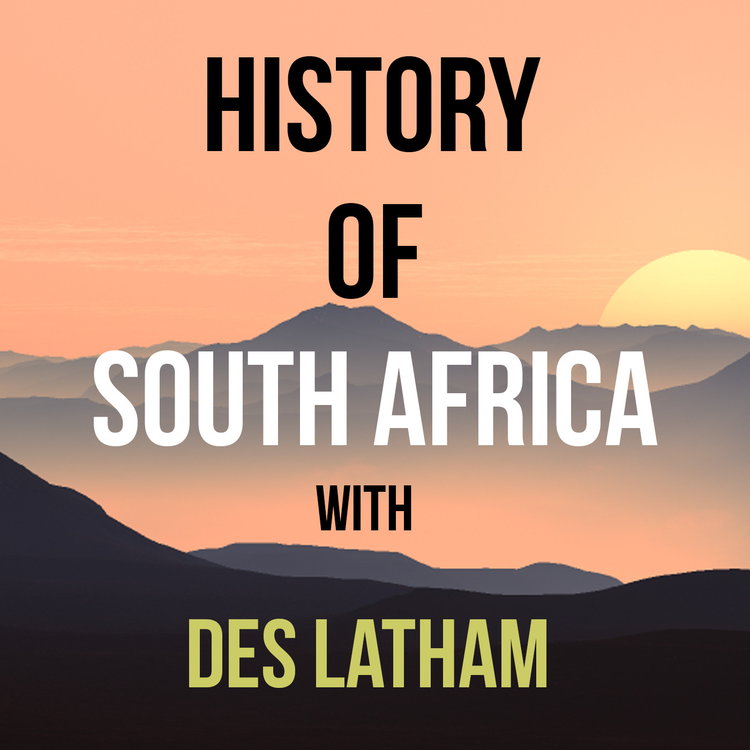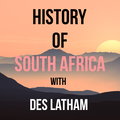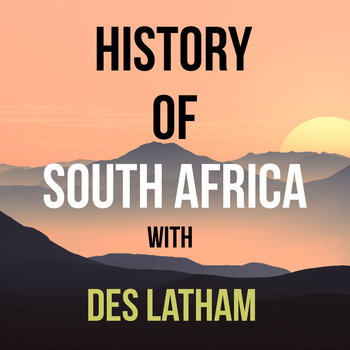
Episode 210 - Social Bandits on the Borderlands and other hybrid tales of Nomansland
Loading player...
This is episode 210 - Barbarians on the Borderlands - the 1857 Basotho Free State conundrum
Last episode we plumbed the depths of the amaZulu civil War battle of Ndondakusuka, this episode we’re skirting Moshoeshoe’s Basotho mountains with the BaPhuthi people.
Before we kick off, just a quick note about terminology and the fact that South African History is a terminological nightmare.
Not my words, those of historian Clifton Crais.
As we all know, living on this mercurial landscape, with our mercurial brothers and sisters, shape-shifting appears to be our national sport. Names and places are changed at the drop of a politicians ribbon. As Crais noted, its called Historical Ethnonyms.
Historical ethnonyms are names that different groups of people have been called over time, often by outsiders. These names can change due to politics, cultural shifts, or language evolution, and some may become outdated or offensive.
So its with that carefully crafted bit of age-restriction warning that we’ll plunge into the fizzy waters of what Barbarians mean. In a nutshell, Barbarian means ” the “raw,” the “primitive.”
On closer inspection those terms mean ungoverned, not-yet-incorporatedoughtful folks, there’s no understanding that people can voluntarily go over to the barbarians. I mean, think about the Vikings for a start. And one persons Barbarian is another person’s Warrior tribe.
So why the explanation? Today’s episode deals with the Baphuthi, about whom many smart thinkers have deployed historical ethnonyms. Post enlightenment bigwigs, those Johnny coke-bottles geniuses, liked to define things. Jean-Jacques Rousseau, bless his powdered nut, case in point. His stages of man starts with the savage, who is a hunter, moves towards barbarian, who is a herdsman to the civilised man, a tiller of the soil. A farmer.
By the mid-19th Century classifying colonial subjects by these criteria determined how they’d be treated. IT is important for our story to understand that there was a geographical element to the ethnic classification. When authorities summed up the situation at any time, representations of the type of environment were crucial. Historian Laura Mitchell has written about this phenomenon, its a rejection of the simplification of settler meets native or coloniser meets subject narrative. More about how the social bandits seize the day on the bad lands, the border lands.
The BaPhuthi people are part of our story about social bandits - particularly by the mid-19th Century. They gathered in the eastern part of the Eastern Cape, on the border with what was to become Basotholand, Moshoeshoe’s land.
They were diverse in origin, these BaPhuthi, comprised of Basotho who did not support Moshoeshoe, San, and a hodge-podge of Nguni speaking societies. The ancient ways of the San mingled through this group, based along the Maloti-Drakensberg and they did not regard the landscape as marginal.
Last episode we plumbed the depths of the amaZulu civil War battle of Ndondakusuka, this episode we’re skirting Moshoeshoe’s Basotho mountains with the BaPhuthi people.
Before we kick off, just a quick note about terminology and the fact that South African History is a terminological nightmare.
Not my words, those of historian Clifton Crais.
As we all know, living on this mercurial landscape, with our mercurial brothers and sisters, shape-shifting appears to be our national sport. Names and places are changed at the drop of a politicians ribbon. As Crais noted, its called Historical Ethnonyms.
Historical ethnonyms are names that different groups of people have been called over time, often by outsiders. These names can change due to politics, cultural shifts, or language evolution, and some may become outdated or offensive.
So its with that carefully crafted bit of age-restriction warning that we’ll plunge into the fizzy waters of what Barbarians mean. In a nutshell, Barbarian means ” the “raw,” the “primitive.”
On closer inspection those terms mean ungoverned, not-yet-incorporatedoughtful folks, there’s no understanding that people can voluntarily go over to the barbarians. I mean, think about the Vikings for a start. And one persons Barbarian is another person’s Warrior tribe.
So why the explanation? Today’s episode deals with the Baphuthi, about whom many smart thinkers have deployed historical ethnonyms. Post enlightenment bigwigs, those Johnny coke-bottles geniuses, liked to define things. Jean-Jacques Rousseau, bless his powdered nut, case in point. His stages of man starts with the savage, who is a hunter, moves towards barbarian, who is a herdsman to the civilised man, a tiller of the soil. A farmer.
By the mid-19th Century classifying colonial subjects by these criteria determined how they’d be treated. IT is important for our story to understand that there was a geographical element to the ethnic classification. When authorities summed up the situation at any time, representations of the type of environment were crucial. Historian Laura Mitchell has written about this phenomenon, its a rejection of the simplification of settler meets native or coloniser meets subject narrative. More about how the social bandits seize the day on the bad lands, the border lands.
The BaPhuthi people are part of our story about social bandits - particularly by the mid-19th Century. They gathered in the eastern part of the Eastern Cape, on the border with what was to become Basotholand, Moshoeshoe’s land.
They were diverse in origin, these BaPhuthi, comprised of Basotho who did not support Moshoeshoe, San, and a hodge-podge of Nguni speaking societies. The ancient ways of the San mingled through this group, based along the Maloti-Drakensberg and they did not regard the landscape as marginal.

